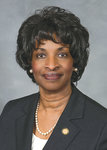


The N.C. General Assembly’s “short” session ended on July 20.
And while the first portion of the session focused on COVID-19 relief, both of Chatham’s legislators — Rep. Robert Reives II (D-District 54) and Sen. Valerie Foushee (D-District 23) — lamented what they saw as a less productive session than they would have liked.
While the legislature did pass several bills related to coronavirus relief, a budget bill failed to pass. And much of the last portion of the session was dedicated to bills regarding re-opening and “limiting the government’s ability to have emergency powers,” according to Reives.
Both Reives and Foushee said that when the legislature was called into session early in the pandemic to handle COVID-19 response, the atmosphere was productive.
“There was a lot of effort for people to work together,” Reives said.
“The first part of the session, working in bipartisan fashion, we did a good job appropriating money from the federal government,” Foushee said.
Even so, Foushee noted that because of a “lack of guidelines” provided by the federal government for COVID-19 relief, she was still concerned about some of the ways that the money was distributed. For example, larger municipalities received federal aid directly from Congress, but much of the other money for other jurisdictions went through state legislatures.
Foushee noted that the federal funding came at a time when municipalities were working on their budgets, with the unknown of the impact of the damage from reductions in sales tax and other revenues due because of pandemic-related — and government-mandated — closures. In addition, as executive orders came through putting a moratorium on sewer and water shut-offs, municipalities were continuing to serve their residents needs without any financing.
“We weren’t able to assist [municipalities] in that regard,” Foushee said. “We did as good as we could have done based on our guidelines.”
Reives echoed that sentiment.
“I wish we were working on the issues to help people get through the pandemic,” Reives said. “If we had kept our focus on ways to help people economically, medically, I feel like we could be more productive.”
Reives wished that the legislature would have “tackled some of the problems exposed” in the unemployment system when the pandemic began. While they did address the amount of time and amount of money a recipient would receive benefits, Reives believed that the system as a whole needed more investment in order to assist those needing unemployment.
In addition, Reives noted that the state should have passed Medicaid expansion. Reives said it “needs to be way beyond a partisan issue” with people needing “healthcare more than ever before.” In addition, Reives argued it was also an economic issue since the expansion is estimated to provide about a $2 billion impact between the jobs created and the healthcare provided.
“More healthcare could help stem the tide of this virus,” Reives said. “It’s too bad we didn’t do that.”
Both leaders said the failure of the legislature to meaningfully address the expansion of broadband access was also a disappointment. Foushee spoke about how virtually learning further demonstrated the divide of access in the state. Reives also noted the challenge for those who need to work from home and that for him, living in rural Goldston, he has been unable to have reliable access for virtual meetings as well.
At the same time, Reives acknowledged that the legislature was able to pass broadband legislation that “works within the system we have now.” The $30 million in grants, he said, are geared to help places like Siler City, calling it a “Tier 3 town in a Tier 1 county,” referencing the Tier system in North Carolina that rates county’s priority in grants distribution based on income and a variety of other fiscal factors. Chatham County is a Tier 1 county which means the state considers it a “wealthy” county, a classification that essentially disqualifies areas like Siler City — which have markedly lower incomes and revenues — for for certain grants and awards.
Both legislators also described a turn when “mask wearing became political” and progress in the legislature began to slow.
“We spent a lot of time on re-opening bills,” Foushee said. “While trying to do what we could to flatten the curve and reduce spread and protect our healthcare system. It put us in a quandary where we have no winners.”
Foushee, who said that she had “loss no less than 10 people to COVID,” the “intent was to protect as much of the economy as we could while protecting the health and safety of the people of North Carolina” which created tension.
“Making it a political statement, some allegiance to a particular party or leader, is not practical at this time,” Reives said. “With this particular disease, if you’re wrong, you affect a number of people.”
When asked to grade the achievements of the General Assembly, Reives and Foushee gave this year’s short session a “C” and “C-” respectively.
The legislators will likely return to the General Assembly before the end of the year to “plug holes” to keep the state going without a passed budget. There are also still millions of federal dollars in COVID relief yet to be appropriated that must be decided and disbursed by December 31.
Foushee was appointed to the state senate in 2013 after serving a year and a half in the N.C. House. Reives was appointed to the N.C. House of Representatives District 54 in 2014. Both have been re-elected ever since and are up for re-election this November.
Casey Mann can be reached at CaseyMann@Chathamnr.com.